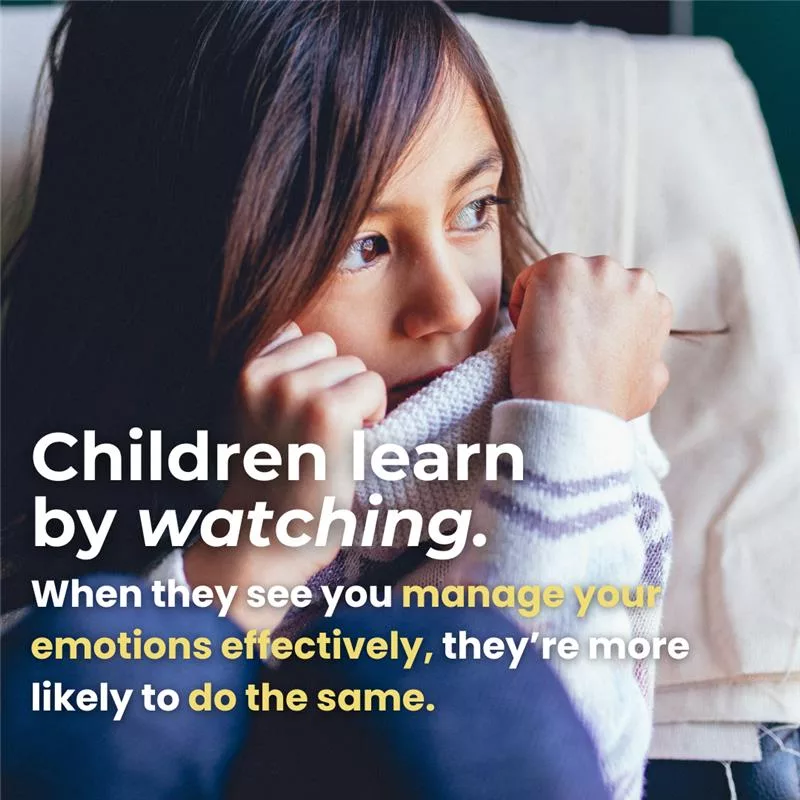Practical Tips for Managing Frustration as a Parent
Picture this: It’s 7:00 AM on a Monday morning. Your coffee is cold, the toddler is wailing because their toast was cut wrong, and your older child just remembered they need a shoebox for their school project… due today. As you try to juggle breakfast, tears, and the growing mountain of chaos, you feel that… Read more

Reviewed by The PsychPlus Team
December 6, 2024

Picture this: It’s 7:00 AM on a Monday morning. Your coffee is cold, the toddler is wailing because their toast was cut wrong, and your older child just remembered they need a shoebox for their school project… due today. As you try to juggle breakfast, tears, and the growing mountain of chaos, you feel that familiar wave of frustration creeping in. Sound familiar?
Parenting can be one of life’s greatest joys, but let’s not sugarcoat it, it’s also one of the most challenging. There are moments when anger bubbles up, threatening to take over, and it’s hard not to feel like you’re failing. But here’s the truth: feeling angry doesn’t make you a bad parent. What matters is how you handle those emotions.
Unchecked anger can affect not only your well-being but also your child’s sense of security and emotional health. Learning to manage those moments of frustration can pave the way for a calmer, healthier relationship with your kids, one where both you and they can thrive.
This is where PsychPlus can help. With access to therapy and professional support, PsychPlus offers guidance to help you better understand and manage your emotions. Whether you’re dealing with everyday parenting stress or deeper challenges, their experts are here to support you on your journey to becoming a more patient and understanding parent. Because parenting isn’t about being perfect, it’s about showing up, even when it’s hard.
Understanding Anger in Parenting
Let’s face it, parenting can sometimes feel like an endless obstacle course, complete with surprise tantrums, missed deadlines, and sleep deprivation. These moments, though universal, can trigger anger in even the most patient parent. Common culprits include chronic stress, lack of sleep, unmet expectations, or simply the overwhelming pressure to do it all.
Feeling angry as a parent is completely natural. After all, you’re only human. But when anger begins to dictate your reactions, it can harm your relationship with your child. The key isn’t to suppress your feelings but to recognize and address them in healthier ways.
Unchecked emotions can often take the form of passive-aggressive behavior, those subtle but sharp remarks or silent treatments that can confuse children and strain relationships. Understanding and addressing these underlying emotions is crucial for maintaining a positive family dynamic. For deeper insights into passive, aggressive tendencies, check out our related blog: Passive-Aggressive Behavior: A Hidden Sign of Mental Illness.
By becoming more aware of your anger triggers and learning to manage them, you can create a more stable and loving environment for both you and your children.
The Impact of Anger on Children
Parental anger doesn’t just stay in the moment, it can leave lasting impressions on your child’s emotional and psychological well-being. When children are frequently exposed to angry outbursts, it can affect how they see themselves and the world around them.
For many kids, witnessing parental anger leads to feelings of fear, confusion, or guilt. Over time, this can erode their self-esteem, making them question their worth or feel like they’re to blame for the tension. Emotional development can also take a hit, as children learn to internalize anger or respond to stress in unhealthy ways.
The long-term effects can include difficulty forming healthy relationships, trouble managing emotions, or even developing anxiety or depression. These challenges often stem from a lack of emotional safety, a vital component for healthy growth.
That’s why modeling emotional regulation is so crucial. When you show your child how to handle anger constructively, whether it’s taking a deep breath, using calm words, or walking away to cool down, you’re teaching them invaluable life skills. Children learn by watching, and when they see you manage your emotions effectively, they’re more likely to do the same.
By making a conscious effort to control anger, you’re not just improving your relationship with your child, you’re giving them the tools to navigate their own emotions with confidence and resilience.

Practical Tips to Manage Parental Anger
Managing parental anger doesn’t require a complete personality overhaul, it’s about small, actionable steps that make a big difference in how you respond to stress. Here are practical strategies to keep your cool and foster a healthier dynamic at home:
a. Take a Pause Before Reacting
When anger begins to bubble up, it’s easy to react impulsively. Instead, pause. Take a deep breath, count to ten, or even step away for a few minutes. These simple actions create space between the trigger and your response, allowing you to approach the situation with a calmer perspective.
b. Identify and Address Stressors
Anger is often the symptom of deeper stressors. Journaling can help you uncover recurring triggers, while therapy provides tools to process and manage them. If you’re feeling overwhelmed, consider scheduling a session with a professional. PsychPlus offers an easy way to take that first step, check out their Book an Appointment feature to connect with a therapist who can help you regain balance.
c. Use Positive Communication Strategies
When addressing your child’s misbehavior, swap yelling for calm, constructive conversations. Explain why certain behaviors are problematic and set clear, consistent boundaries. Positive communication not only diffuses tension but also teaches your child how to navigate conflicts respectfully.
d. Build a Support Network
Parenting isn’t meant to be a solo mission. Lean on your support system, whether it’s family, friends, or local parent groups, to share the load. If you’re struggling to find resources, PsychPlus’s referral page can connect you with professionals and services to help you manage the challenges of parenthood.
By incorporating these strategies into your daily life, you can reduce frustration, strengthen your bond with your children, and create a home filled with more patience and understanding.
Managing Anger During Holidays and Parties
Holidays and parties are meant to be joyful, but they can also bring their fair share of stress, especially for parents. The pressure to create picture-perfect moments, juggle family dynamics, and keep everyone happy can make even the calmest parent feel frazzled. Here’s how to keep your cool and enjoy the season with your loved ones:
Identify Seasonal Stressors
From planning elaborate meals to managing tense family dynamics, the holidays come with unique stressors. Unrealistic expectations, whether from yourself or others, can pile on the pressure. Recognizing these triggers early can help you approach the season with a more grounded mindset.
Set Realistic Expectations
Perfection is overrated. Focus on what truly matters: connecting with your loved ones and creating meaningful memories. If the turkey’s a little dry or the decorations don’t match Pinterest standards, that’s okay! Embrace the chaos and remind yourself that imperfections often lead to the best stories.
Practice Self-Care Before Events
A little self-care can go a long way in managing holiday stress. Take some quiet time before gatherings, whether that’s a quick walk, meditation, or simply enjoying a cup of coffee to center yourself. When you enter the event feeling calm and collected, you’re better equipped to handle challenges.
Involve Children in Planning
Turn holiday prep into a family affair! Assign age-appropriate tasks like setting the table, wrapping gifts, or decorating. Not only does this ease your workload, but it also teaches your children responsibility and helps them feel included in the festivities.
Create Calm Spaces
Sometimes, the hustle and bustle of holiday gatherings can overwhelm parents and children alike. Set up a quiet area where anyone can retreat to take a breather. Whether it’s a cozy corner with a book or a room where kids can wind down, having a designated calm space can be a lifesaver when emotions run high.
By planning ahead and focusing on what truly matters, you can turn holiday stress into opportunities for connection and joy. Remember, the holidays aren’t about being perfect, they’re about being present.

Nurturing Emotional Health in Children
When parents actively manage their anger, the benefits extend far beyond themselves; it creates a ripple effect that nurtures their child’s emotional health. Children learn to regulate their own emotions by watching how you handle yours. When you model calmness in difficult moments, you’re teaching your child that it’s okay to feel upset and showing them healthy ways to process those feelings.
Creative tools can also play a role in fostering emotional regulation. For example, therapy dolls can help children express their feelings and work through challenges in a safe, imaginative way. To explore how therapy dolls can support your child’s emotional development, check out our related blog: How to Use Therapy Dolls for Depression in Children.
By prioritizing your own emotional health, you’re equipping your child with the skills they need to navigate their emotions confidently and constructively.
Building a Long-Term Anger Management Strategy
Anger management isn’t a one-time fix, it’s an ongoing practice that involves consistency and self-awareness. Here are some strategies to build a sustainable plan for emotional control:
Practice Mindfulness and Meditation
Mindfulness can help you stay present and calm in stressful moments. Simple meditation practices, even just five minutes a day, can improve your ability to pause and respond thoughtfully instead of reacting impulsively.
Prioritize Consistent Self-Care
Taking care of yourself is essential to managing your emotions. Regular exercise, pursuing hobbies, and ensuring you get enough rest can reduce stress levels and make you more resilient to triggers. Self-care isn’t selfish, it’s necessary.
Seek Out Mental Health Resources
When challenges feel overwhelming, professional support can make a world of difference. PsychPlus provides a wealth of resources for mental health. Visit our Blog Page to explore helpful articles and insights to guide you on your journey.
By weaving mindfulness, self-care, and professional support into your daily routine, you can create a long-term strategy that benefits both you and your family. Anger doesn’t have to define your parenting journey, it’s just one emotion among many, and with the right tools, you can handle it with confidence.
Conclusion
Managing anger as a parent is not about achieving perfection, it’s about progress. It’s a journey of self-awareness, patience, and growth that can transform not only your relationship with your children but the entire family dynamic. By taking steps to stay calm and present, you create a nurturing environment where your children feel safe, valued, and understood.
If you’re ready to take control of your emotions and foster a healthier home life, remember you don’t have to do it alone. PsychPlus is here to support you with resources and professional guidance tailored to your needs.
Take the first step today, schedule an appointment with PsychPlus and explore strategies to help you become the parent you aspire to be. Your journey to calmer, more connected parenting starts here.
Find a mental health care provider near you
Learn about the conditions we treat


